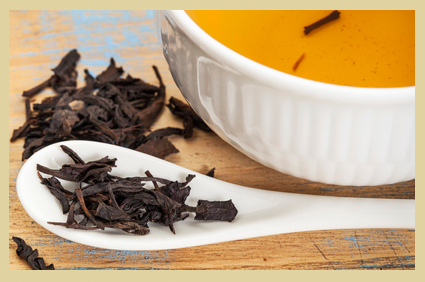Oolong Tea – A Traditional Chinese Tea

Oolong Tea is produced through a unique process including withering under the strong sun and oxidation before curling and twisting. Most oolong teas, especially those of fine quality, involve unique tea plant cultivars that are exclusively used for particular varieties. The degree of oxidation can range from 8 to 85%, depending on the variety and production style. Oolong is especially popular with tea connoisseurs of south China and Chinese expatriates in Southeast Asia, as is the Fujian preparation process known as the Gongfu tea ceremony. In Chinese tea culture, semi-oxidised oolong teas are collectively grouped as qīngchá. The taste of oolong ranges hugely amongst various subvarieties. It can be sweet and fruity with honey aromas, or woody and thick with roasted aromas, or green and fresh with bouquet aromas, all depending on the horticulture and style of production. Several subvarieties of oolong, including those produced in the Wuyi Mountains of northern Fujian, such as Da Hong Pao, are among the most famous Chinese teas. Different varieties of oolong are processed differently, but the leaves are formed into one of two distinct styles. Some are rolled into long curly leaves, while others are ‘wrap-curled’ into small beads, each with a tail. The former style is the more traditional of the two in China.
-
Oolong Tea – Health Benefits
The health benefits of Oolong tea are numerous and remarkable. Here is our list of the Top Health Benefits of Oolong Tea.
1. Weight Management – The polyphenol compound found in oolong tea is very effective in controlling the metabolism of fat in the body. It activates certain enzymes, thereby enhancing the functions of fat cells in the body. It is commonly believed that daily consumption of oolong tea can reduce obesity. More widespread studies need to be done on humans, but early studies are very promising. In one animal study, mice that were given polyphenols in addition to a high-fat and high-sugar diet still showed a decline in overall body weight and fat index. Some earlier studies actually showed that the caffeine content was the active ingredient behind the weight loss, but it now appears to be mainly due to polyphenols. Apparently, the active components in oolong tea make fat work for you!
2. Removal of harmful free radicals – The polyphenolic compound in oolong tea is also responsible for the removal of free radicals in our body, because it functions as an antioxidant and stimulates the behavior of other free radical compounds in the body. Therefore, consuming daily doses of oolong tea can help people from the potential harm that these free-moving cells often pose to the human body, including cancer, atherosclerosis, stroke, rheumatoid arthritis, neurodegeneration, and diabetes. Any antioxidant characteristic of food or drink is beneficial, but polyphenols are particularly powerful antioxidants in oolong tea.
3. Healthy skin – According to scientific experiments, patients diagnosed with eczema can benefit from drinking 3 cups of oolong tea throughout the day. The beneficial results of oolong tea could be seen in less than a week in these patients, who showed remarkable improvement in their skin. Although the active mechanism has not been pinpointed exactly, many believe that the polyphenols present in oolong tea also work as anti-allergenic compounds, thereby relieving irritation and chronic skin problems, known as atopic dermatitis. In a 2001 study, 54% of test subjects were found to show positive, long-lasting results in terms of skin conditions after 6 months of daily intake of oolong tea.
4. Healthy bones – The antioxidants present in oolong tea protect teeth against decay, strengthen the bone structure, prevent osteoporosis, and promote normal, healthy growth of the human body. A number of studies analyzed the long term effects of drinking tea, particularly on bone mineral density (BMD). It showed that people who consistently drank black or oolong tea for more than 10 years were tremendously less likely to lose their bone mineral density over that span of time. It is thought that some of the components in tea actually stimulate the retention of minerals from other food that we consume.
5. Controls diabetes – Oolong tea is used as an herbal brew for treating type-2 diabetic disorders and as an addition to other supplementary drugs for treating that disease. It regulates the amount of blood sugar and insulin that is in the bloodstream at any one time, so the dangerous dips and spikes in blood sugar that can be so disastrous for diabetic patients was reduced. A 2003 study showed that when combined with regular hyperglycemic drugs, oolong tea further balanced the blood sugar levels and prevented the sudden drops in almost all of the test subjects.
6. Anti-cancer properties – It is well-known fact that tea drinkers have a lower risk of getting skin cancer. Moreover, polyphenolic compound in oolong tea promotes apoptosis in stomach related cancerous growths. This polyphenol extract also acts a chemo-preventive instrument against the development of other cancerous forms. The compounds stifle the activation of carcinogenic cells, prevent the formation of N-nitroso compounds, and trap genotoxic agents before they can become effective.
7. Stress management – In a detailed study conducted at the Osaka Institute for Health Care Science in Japan, the experimental mice that ingested oolong tea showed a remarkable improvement in their stress levels by 10 to 18 %. The natural polyphenols in the oolong tea was cited as the main cause of it being such a stress-buster. Also, the L-theanine found in tea leaves is an amino acid that blocks L-glutamic acid to glutamate receptors in the brain. This would normally cause cortical neuron excitement, which leads to increased cognitive activity and neural stress responses. Since this amino acid binds to those sites, excitation doesn’t occur, and stress decreases because you are more able to keep your mind at rest.
8. Mental performance and health – Health benefits of oolong tea include improved mental performance and alertness. Regular intake of caffeine rich oolong tea may help in improving mental performance and maintaining alertness throughout the day.
-
Scientific Study
Tea has been historically used as medicine in China and it is commonly believed that Chinese Tea has many health benefits. Recently scientists have become interested in studying the benefits of Oolong Tea and have discovered that these benefits are not simply legends, but scientific facts. During the Ming Dynasty (1368-1644), Li Shizhen wrote the book titled; the Compendium of Materia Medica (Bencao Shiyi). In the book it states that Drinking Tea for extended periods of time will make on live longer and keep them from becoming obese. Scientific studies of the benefits of Oolong Tea are ongoing and it is expected that many new discoveries will be found. Oolong Tea contains a full range of antioxidants, is good for helping in the fight against cancer, heart disease, eczema, diabetes and high blood pressure. All of these benefits are combined with the wonderful flavors and aroma of Oolong Tea. It is no wonder that Oolong Tea is so popular.






We are PayPal Verified
Verification of identity increases our customer trust because it creates a higher level of confidence that when you purchase products from the Tea Noosh Store, your identity and information is kept private. And don’t worry, we promise NEVER to share your personal information with anyone.

